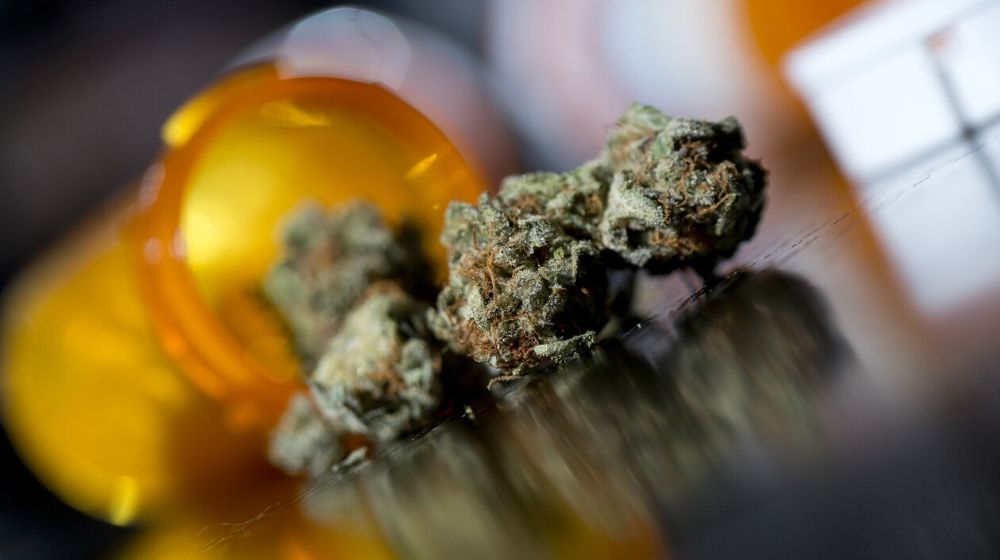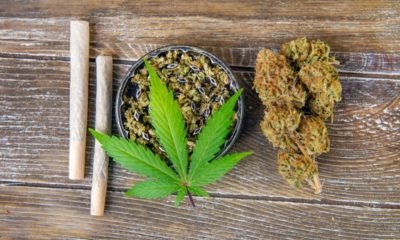Health
More Doctors Are Using Marijuana as Medicine

The doctor's appointment started like any other.
Dr. Rahul Khare asked his patient, a 44-year-old woman from Chicago's North Side, if she was feeling fully recovered from a recent virus. He asked if she'd gotten her flu shot. Then the appointment veered into more unusual territory.
“Now, let's talk about medical cannabis,” the Lincoln Park doctor said.
The patient, who is certified to take medical cannabis for fibromyalgia, said it had alleviated her chronic pain, helped her sleep and improved her mood, but the THC was making her feel “glazed” during the day. After listening to her breathing, Khare brought in the clinic's medical marijuana consultant to discuss what type of cannabis product might work better.
Khare is one of at least a handful of Chicago-area doctors who have made medical cannabis a focus of their primary care practices – even as some physicians remain wary of its use. He and others say it's the future of primary care, and they expect to see more doctors recommend it, especially as the legalization of recreational pot Jan. 1 lessens the stigma surrounding cannabis.
Medical marijuana has been available in Illinois since 2015. To get it, patients must have a doctor sign a certification that they have a qualifying condition, and patients can then get a card to buy cannabis at dispensaries. To certify patients, a doctor must have a physician-patient relationship with them, assess their medical history and have conducted a recent in-person exam.
Qualifying conditions include dozens of maladies, from autism to rheumatoid arthritis to migraines. The Illinois Department of Public Health has approved nearly 91,000 patients for medical cannabis use since the program started.
More than 4,500 Illinois doctors certified patients for medical marijuana between July 1, 2018 and June 30, 2019, the health department said.
Some doctors are making it clear that they don't want to just certify patients in need of pot; they want to be those patients' first call when they're sick or in need of medical advice.
“The patient comes in for the medical (marijuana) card and then ends up staying,” said Dr. Mauricio Consalter, a primary care doctor at Medici Health Care in Chicago's Wicker Park and Andersonville neighborhoods.
Consalter has been practicing at Medici for four years. His practice does not take health insurance, instead charging a flat fee for patients who receive certification. Marijuana use is still illegal at the federal level, and health insurance does not cover medical cannabis, meaning patients must pay out-of-pocket to purchase it from dispensaries.
“It's going to be part of any family primary care practice in the future,” Consalter said.
Khare, a former hospital emergency room doctor, began offering cannabis-focused primary care as part of his Innovative Wellness practice about two months ago. He also has an urgent care facility and an office that's been certifying patients for medical marijuana for about four years. He said his practice has certified about 10,000 patients.
Some have criticized doctors who certify large numbers of patients for medical marijuana – worrying that, for some, it may be little more than a money-making vehicle.
The state health department has sent requests for patient records to some doctors who have submitted suspicious physician certifications, spokeswoman Melaney Arnold said. The department has referred one doctor to the Illinois Department of Financial and Professional Regulation for inappropriately certifying patients, she said.
Khare said he's never had a problem with the state. He said he fills a need for patients with valid medical problems.
“We've gotten a lot of patients who, lo and behold, use cannabis medically but because it was illegal (federally), they didn't feel like they could tell their doctor,” Khare said. “People love it that they can come up to our doctors and say, ‘Hey, we use cannabis, can you help me with it?'”
Khare's Lincoln Park office has an eastern feel to it, with small decorative elephants lining shelves and Indian artwork hanging from walls. The decorations reflect the practice's focus on wellness, rather than just traditional western medicine, Khare said.
His office also sells cannabidiol, known as CBD, that patients can mix with medical cannabis as part of their treatment. CBD is legal and widely available. An in-office consultant meets with patients to suggest cannabis strains and dosages at area dispensaries that might work best and walk them through the process of how to use it.
Khare accepts health insurance, billing insurers for doctor visits and related services just as any other physician would, even though the cannabis products themselves aren't covered.
Still, some physicians remain cautious about working with marijuana, and some question the doctors that are heavily involved in recommending its use.
The American Medical Association opposes the legalization of medical marijuana by states, saying in a policy statement that “scientifically valid and well-controlled clinical trials conducted under federal investigational new drug applications” are needed to assess the safety and effectiveness of all new drugs, including marijuana.
Thirty-two states and the District of Columbia have legalized medical marijuana. Illinois will become the 12th state to legalize recreational marijuana Jan. 1.
Some physicians also wonder whether primary care doctors should be the ones helping patients control symptoms such as pain through marijuana.
Medical marijuana is just one of many ways to treat pain, said Dr. Jay Joshi, owner of the National Pain Centers in Vernon Hills and Hoffman Estates, who is board-certified in anesthesiology and interventional spine and pain management.
“If you're going to be managing pain, you better know how to manage it from a complex standpoint,” said Joshi, who certifies patients for medical cannabis. “If you're not qualified to treat all aspects of pain, why are you treating any aspects of pain?”
It's also possible, however, that some patients choose to see primary care docs who focus on medical cannabis because they can't see pain specialists quickly enough or are confused about what pain specialists do, he said.
There's also uncertainty about how the legalization of recreational marijuana on Jan. 1 will affect the practices of cannabis-focused doctors.
In California, many of the doctors who made businesses out of certifying medical marijuana patients found themselves out of luck when recreational use became legal in 2018, said Dale Gieringer, director of California NORML, a nonprofit that advocates for “sensible and fair” cannabis laws. Many patients preferred to go to dispensaries and get marijuana without the hassle of getting a doctor's approval, he said.
But doctors who specialized in treating certain conditions with medical marijuana continued to see demand, he said.
In Illinois, there might be an initial drop-off in the number of patients seeking medical marijuana certification once recreational use becomes legal, said Dr. Leslie Mendoza Temple, a Glenview family and integrated medicine doctor who sees many medical marijuana patients. Mendoza Temple led the state's former Medical Cannabis Advisory Board.
But she expects that doctors who integrate it into their practices will continue to see demand. Weed shortages are expected, and medical marijuana patients will have priority access.
Also, the state sales tax on medical cannabis is 1%, while the state sales tax on recreational marijuana will be between 10% and 25%, depending on the type of product and its potency.
Doctors such as Khare also believe their focus on treating patients with marijuana will set them apart even when patients no longer need their doctors' consent to use it. Dispensaries typically provide advice on how to use medical marijuana, but many patients like to have a doctor's input, he said.
“I think that there's going to be way more people that are going to use cannabis medically now that it's legal than ever before, and they're going to be very confused on how to use it,” Khare said. “There's going to be a huge influx of people wanting guidance.”
Megan and Matt Lassman, of Evanston, said they appreciated having a doctor's assistance when they decided to put their 14-year-old daughter Penelope on medical cannabis. Parents seeking medical cannabis certifications for their children must get two doctors to certify them.
Penelope has cerebral palsy, vascular abnormalities and is nonverbal. Around the age of 9, she became violent, hitting herself in the mouth until she bled. She would scream and bite. Traditional medications weren't controlling her behaviors and had troubling side effects, Megan Lassman said.
The difference has been dramatic, Megan Lassman said. The ninth-grader is now quick to smile and is hurting herself far less often, her mother said.
[email protected]
© Copyright 2019, Mundelein Review, Pioneer Press. All rights reserved. REPRODUCTION PROHIBITED.












